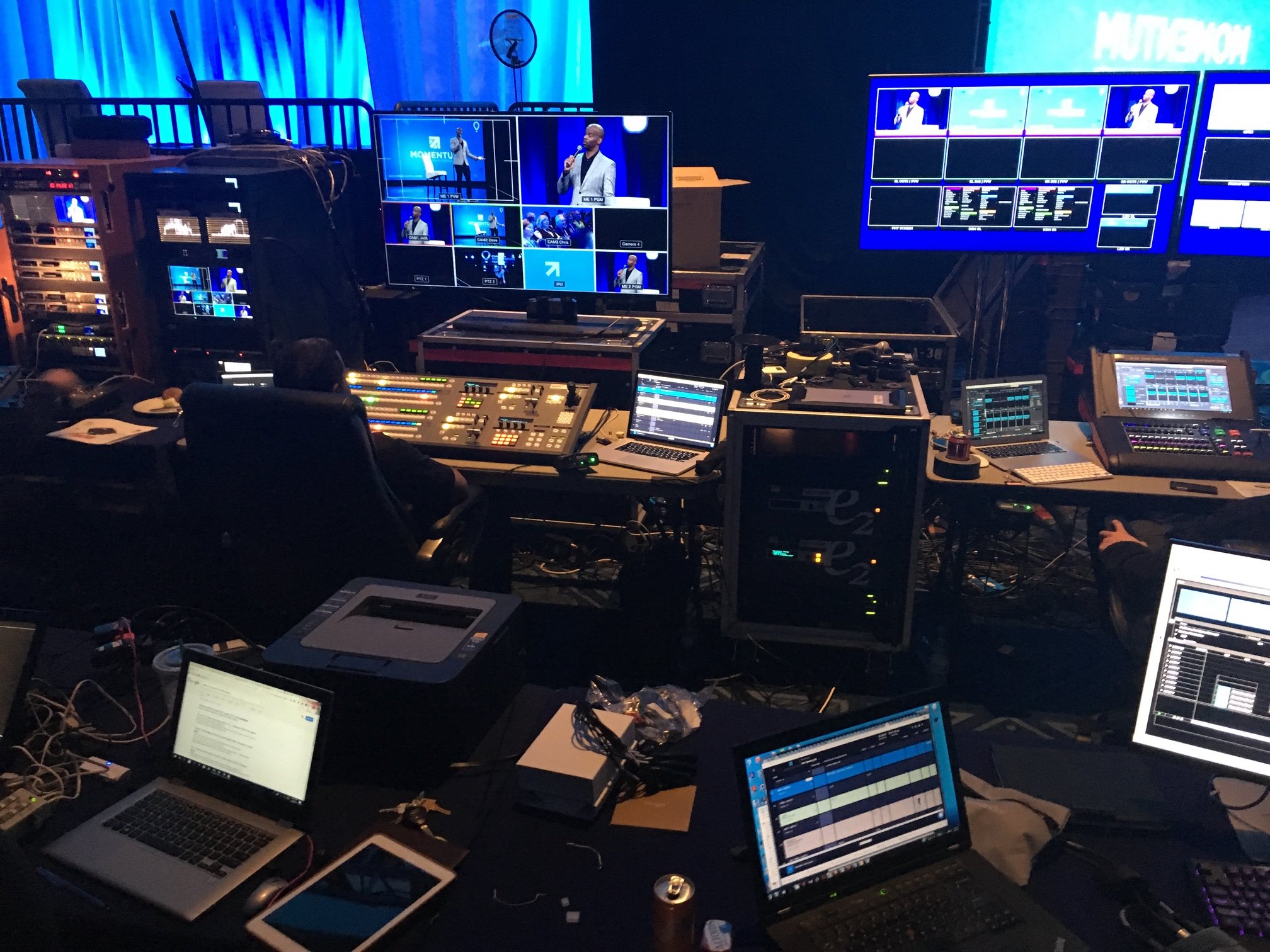Exactly How Event Production Works: A Comprehensive Look at the Refine
Event production is a facility and organized process that requires careful preparation and implementation. It starts with developing clear purposes and recognizing the target audience. Each step, from budgeting to place choice, plays a vital role in ensuring success. As the procedure unfolds, various components should align flawlessly. The subtleties of this elaborate procedure typically go unnoticed. What are the vital stages that add to an unforgettable event?

The First Drawing Board
When starting on event production, careful planning is important to assure an effective outcome. The initial drawing board acts as the foundation for all succeeding initiatives. During this phase, event manufacturers need to define the event's purpose and purposes plainly. Determining the target audience aids customize the experience and messaging, guaranteeing relevance and engagement.Producers have to additionally think about the event format, whether it be in-person, digital, or hybrid, as this will affect different logistical elements. Choosing a suitable day and location is crucial, as it influences availability and availability.Furthermore, putting together a reputable group is essential for dividing obligations and improving interaction. Establishing a timeline with landmarks guarantees all jobs are completed on time. This phase includes thorough research study, including determining possible challenges and designing techniques to minimize risks. Eventually, a well-structured first planning phase establishes the tone for a successful event production journey.

Budgeting and Source Allocation
In event production, efficient budgeting and source appropriation are crucial for success - event production charlotte. Establishing monetary criteria establishes the structure for all subsequent decisions, while source circulation approaches assure that every component of the event is properly supported. With each other, these components aid maintain control over expenses and maximize using available resources
Establishing Financial Parameters
Establishing monetary specifications is crucial to the success of any type of event production, as it establishes the structure for efficient budgeting and resource allotment. This process begins with defining the overall budget, which encompasses all aspects of the event, consisting of place prices, wedding catering, and advertising and marketing. By recognizing offered funds, event coordinators can prioritize expenditures and allot sources appropriately. On top of that, it is vital to conduct comprehensive market research to prepare for possible expenses and identify financing sources, such as sponsorships or ticket sales. Establishing clear economic specifications also help in danger management, permitting organizers to allot backup funds for unexpected expenditures. Eventually, a well-defined spending plan functions as a roadmap, leading the event production team in the direction of accomplishing their goals while keeping financial control.
Source Distribution Approaches
Efficient source distribution strategies are necessary for making best use of the effect of an occasion while adhering to spending plan constraints. Effective event production calls for a careful approach to budgeting and resource appropriation. Planners need to prioritize vital components such as location, wedding catering, and technology, making sure that funds are allocated to areas that boost attendee experience. A comprehensive spending plan should detail anticipated expenses and identify locations for possible cost savings, such as discussing with suppliers or exploring sponsorship chances. Furthermore, tracking expenses throughout the preparation procedure helps avoid overspending. By utilizing calculated source distribution, event producers can deliver an unforgettable experience while preserving monetary duty, inevitably adding to the overall success of the event.
Place Option and Logistics
Picking the right venue is important to the success of any type of event, as it establishes the stage for the general experience. Location choice involves assessing various factors, consisting of ability, access, and area. Coordinators should think about the target audience and the nature of the event, ensuring the venue straightens with the event's goals.Logistics play a substantial function in this process, entailing setups for seating, audiovisual equipment, and providing solutions. A well-chosen place must help with smooth flow for participants and personnel, enhancing engagement.Additionally, assessing prospective venues for amenities like car park, bathrooms, and fire escape is essential for safety and comfort. The timeline for protecting the place is likewise crucial, as preferred places might book promptly - event production charlotte. As a result, comprehensive preparation and timely implementation can ultimately add to a smooth event experience, making venue option and logistics fundamental parts of successful event production
Innovative Idea Growth
While the venue sets the physical phase, imaginative concept advancement forms the event's identification and narrative. This process begins with recognizing the event's purpose and target audience, enabling event manufacturers to create a compelling theme that resonates with guests. Conceptualizing sessions often include varied viewpoints, cultivating innovative ideas that align with the event's goals.Once a style is developed, aesthetic components such as shade palettes, signage, and decor are developed to improve the general environment. Narration methods might likewise be incorporated to produce an appealing trip for participants, ensuring an unforgettable experience. Furthermore, considerations relating to enjoyment, tasks, and interactive elements are lined up with the chosen concept, reinforcing the motif throughout the event.Ultimately, reliable creative principle development warranties that every aspect of the event works cohesively, leaving a long lasting impression on attendees and meeting the event's goals. This foundational job lays the foundation for subsequent planning and execution phases.
Teaming up With Vendors and Providers
Successful event production depends upon efficient collaboration with suppliers and distributors. Choosing trustworthy partners, working out contracts successfully, and guaranteeing prompt shipments are crucial actions in this process. Each of these aspects adds significantly to the total success and smooth implementation of an event.
Choosing Reliable Partners
Exactly how can event planners ensure a seamless production experience? Choosing dependable companions is important in attaining see this goal. Event organizers should perform extensive study to identify suppliers and suppliers with a tested record of excellence. This consists of examining references, examining profiles, and assessing consumer comments. Organizers should prioritize companions that show top article expertise, timely communication, and a desire to team up. Building strong connections promotes trust and allows fast analytic throughout the event. Additionally, it is useful to pick neighborhood suppliers that understand the venue and regional logistics. Ultimately, a successful event hinges on the synergy between coordinators and their companions, making sure that every element of production runs efficiently and successfully.
Bargaining Agreements Properly
Reliable arrangement of agreements is an essential action in the cooperation in between event coordinators and their vendors and providers. This process involves clear communication of assumptions, deliverables, and timelines. Organizers need to perform detailed study on market rates and industry standards to develop a standard for settlements. It is necessary to create a collaborative ambience, motivating open dialogue concerning terms, prices, and prospective contingencies. Organizers must also focus on recognizing the vendor's capabilities and constraints to align their needs successfully. Versatility can lead to equally useful agreements, cultivating long-lasting relationships. Crafting distinct contracts that consist of specific efficiency metrics can help assure accountability, inevitably resulting in effective event execution and complete satisfaction for all events included.
Ensuring Timely Distributions
Timely distributions are important for the smooth implementation of any event, calling for diligent partnership in between planners and their vendors and distributors. Effective interaction is vital, as it assists develop clear assumptions regarding shipment timetables, quantities, and particular demands. Coordinators typically develop detailed timelines to describe essential milestones, guaranteeing all celebrations continue to be straightened throughout the process. Normal check-ins with vendors can help determine prospective hold-ups early, permitting for aggressive solutions. Additionally, building strong connections with trustworthy distributors cultivates trust fund and accountability, which can result in better service and prioritization. By focusing on these joint initiatives, organizers can decrease disturbances, therefore boosting the total performance of event production and making certain that all essential products and services arrive as planned.
Marketing and Promo Approaches
While arranging an event, the success of advertising and marketing and promo techniques can greatly affect attendance and involvement. Efficient strategies usually include a mix of digital marketing, standard advertising, and grassroots outreach. Making use of social networks systems enables for real-time communication and targeted advertising, getting to specific demographics successfully. Email marketing projects can further engage possible attendees with individualized content and reminders.Collaborations with influencers or market leaders can additionally enhance reputation and broaden reach. Creating appealing web content, such as videos or blogs, assists to create buzz and suffer rate of interest leading up to the event. In addition, leveraging early-bird discounts and special advantages can incentivize ticket purchases.Promoting via conventional channels, such as posters or regional media, continues to be relevant, especially in community-focused events. A complete approach that incorporates numerous strategies guarantees maximum exposure and interaction, eventually adding to the event's success and the production of a remarkable experience for participants.
On-Site Implementation and Monitoring
On-site implementation and monitoring are essential components that identify the overall success of an event. Effective coordination during the event assures that all components straighten with site link the intended program. Event managers supervise logistics, including vendor control, tools arrangement, and visitor services. Keeping an eye on timelines and attending to any type of unexpected issues are basic for keeping a seamless experience.The staff plays a significant duty, as skilled workers are accountable for various jobs such as registration, information circulation, and technological support. Interaction among team participants is imperative; it cultivates a collective environment and makes it possible for quick resolution of challenges.Additionally, safety methods should be stuck to, guarding the wellness of all participants. Post-event examinations are also component of on-site management, giving insights for future renovations. By focusing on these facets, event producers can develop unforgettable experiences that fulfill or exceed participant expectations while accomplishing the event's objectives.
Often Asked Questions
Exactly how Do I Pick the Right Event Theme?
Picking the right event style entails thinking about the target market, event purpose, and location. Looking into current patterns and collecting input from stakeholders can additionally inspire innovative concepts that resonate and create an unforgettable experience.

What Prevail Blunders in Event Production?
Typical mistakes in event production usually include poor planning, poor interaction among staff member, spending plan mismanagement, overlooking to think about the target market's needs, and stopping working to conduct a detailed post-event assessment for future renovations.
Exactly How Can I Gauge Event Success?
To measure event success, one can examine participant fulfillment, engagement levels, spending plan adherence, and post-event feedback. Secret efficiency indicators, such as ticket sales and social networks communications, also supply beneficial insights into total effectiveness.
What Should I Do if It Moistens the Event Day?
In the event of moisten the day, the coordinator should carry out backup strategies, such as securing camping tents or relocating tasks inside. Communication with attendees regarding modifications is important to guarantee a smooth experience in spite of weather condition obstacles.
Just How Can I Ensure Attendee Engagement During the Event?

Comments on “What to watch out for and how event production charlotte keeps you on track”